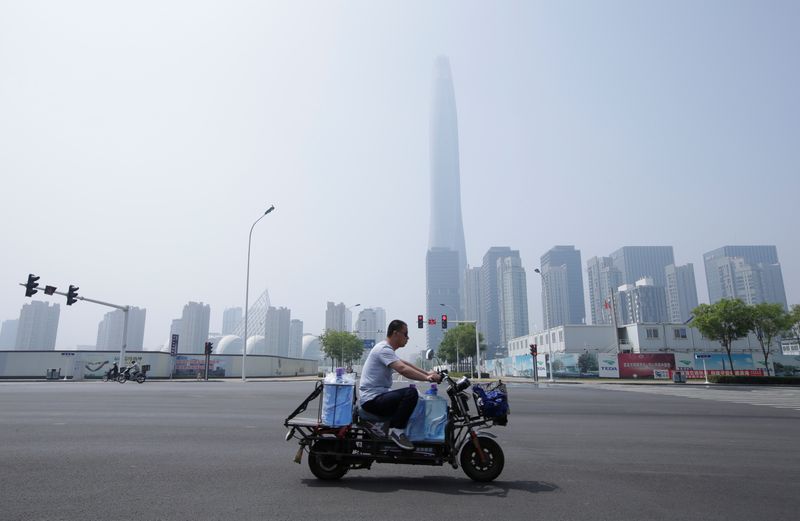By Ellen Zhang and Marius Zaharia
BEIJING/HONG KONG (Reuters) - China's local governments have fallen behind on their debt issuance plans as scrutiny mounts over potentially wasteful infrastructure investment, fuelling talk that such funds could be used in other areas to stimulate growth back towards target.
Investment at a municipal level has for years been one of the most efficient tools to stabilise growth in the world's second-largest economy, whose poor performance in recent months calls for another injection of government stimulus.
But not all such investment has been productive, as evidenced by debt rising faster than growth in the past decade Large sums were spent on rail, roads and bridges that draw little traffic and are expensive to maintain.
To rein in wasteful spending, authorities have tightened scrutiny on investment projects, especially in China's 12 most indebted provinces.
As a result, in the first seven months of this year, local governments have issued only 45.5% of their 3.9 trillion yuan ($546 billion) special debt quota versus 65.7% in the same period of 2023 and 95% in 2022.
The softer-than-expected fiscal impulse risks pulling economic growth away from this year's roughly 5% target, which is threatened by sluggish household consumption and a severe property sector downturn.
"It has been difficult to find projects that are profitable in the near term," said Jack Yuan, senior analyst at Moody's (NYSE:MCO) Ratings. "Many provinces will have difficulties trying to meet their growth targets in the absence of greater state-led investment."
Chinese officials said in March that local special bonds would fund projects with "sufficient preparation" in regions with high investment efficiency.
Yuan and other analysts expect debt issuance to pick up in coming months as authorities prioritise reaching the growth target, as pledged at key political meetings in July.
But this may require Beijing to greenlight new ways for cities and provinces to spend the funds, which are typically used for transportation, water, energy, urban landscaping and other infrastructure.
Analysts say new areas could include buying empty apartments for social housing or repurchasing undeveloped residential land. Such moves would inject cash into the crisis-hit property sector, providing a lifeline for developers to resume or accelerate construction of behind-schedule residential projects and improving homebuyer confidence.
"The government needs to expand the scope for these bonds," said Larry Hu, chief China economist at Macquarie, who sees real estate as a potential new destination for such funds.
"We will see issuance accelerating, the fiscal support for the economy will rise and then we may still be able to achieve the growth target."
Chinese newspaper Economic Observer reported in June that the Ministry of Natural Resources had proposed that local governments use special bonds to repurchase idle land.
Alternatively, municipal bonds could be used to swap higher-yielding debt issued by local government financing vehicles to ease their funding strain and reduce spillovers to the real economy as they deleverage, Yuan from Moody's said.
WASTE
Infrastructure investment grew 4.9% year-on-year in January-July, slower than the 6.8% rise in the same period of 2023.
One government source from Lanzhou, the capital in the indebted Gansu province, said one area local authorities are spending less on is urban landscaping.
While special bonds can be spent on expanding green areas, in many cases that meant replanting a perfectly good park lawn or roadside flowers and greenery, rather than creating new green spaces, the source said.
This generates temporary jobs. But it does not improve living standards long-term, nor offer any returns, while committing the government to debt repayments. Such spending no longer occurred this year, the source said.
"That was a waste," the source said, asking not to be named as they were not authorised to speak to media. "The principle was to spend the money, otherwise it would be taken away."
A source in the Beijing municipal government said "in the past, it was easier to apply for funds. When anyone applied for projects they would ask for as much as possible."
Now "we need to figure out why the project must be done. They say every project is a cost."

One policy adviser, who also requested anonymity due to the topic's sensitivity, said leaning on government investment to fuel growth has resulted in debt and corruption. Local officials need to find projects that produce enough income to repay debt interest, the adviser said.
"But such projects don't exist every year," the adviser said, explaining the slow debt issuance. "It's better to give the money to low-income groups to boost consumption."
(Graphic by Kripa Jayaram; Editing by Shri Navaratnam)